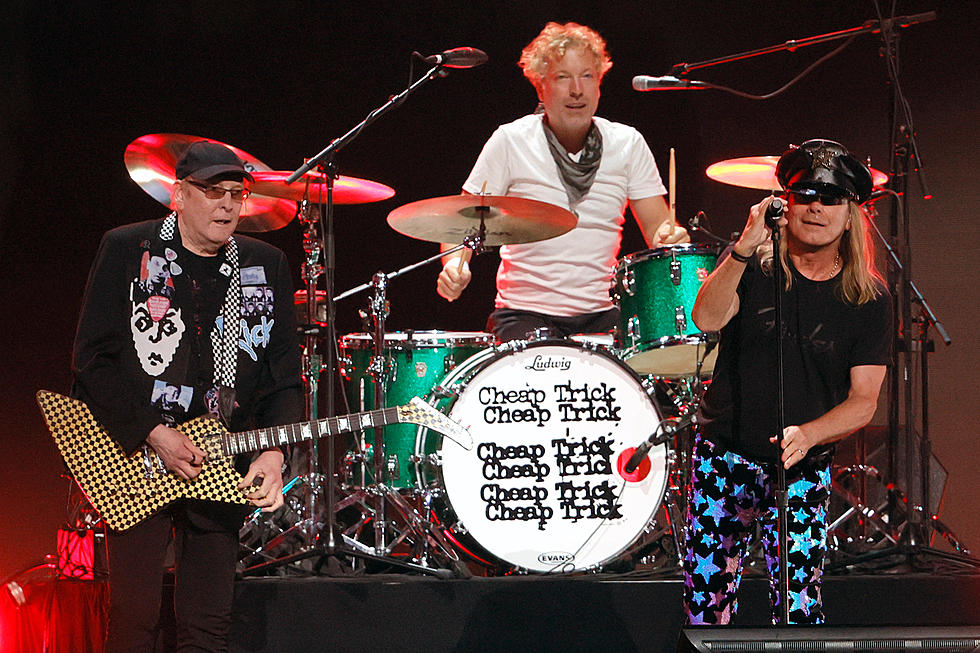30 Years Ago: Cheap Trick Slip While ‘Standing on the Edge’
It was a slow and steady climb for Cheap Trick as they rose to prominence in the late '70s. As the '80s began, so did a slow and steady fall from fortune, and they tried to reverse the process with the release of their eighth album, Standing on the Edge in October 1985.
Early on, Cheap Trick were on the road constantly, opening shows for everyone from Kiss and Rush to the Kinks and Lou Reed. With the release of At Budokan in early 1979, the band were suddenly thrust into headliner status.
But by the mid-'80s, following the less than bank-breaking sales of One on One and Next Position Please, Cheap Trick found themselves once again supporting bands like REO Speedwagon and Heart. "Opening for certain acts after so many years of headlining obviously made us resentful," singer Robin Zander told KerrangI back in 1985. "It was kind of hard watching all these bands who I really believed didn't deserve to be on top musically going ahead and pushing us out."
To try to turn around the bus around, they called in an old friend to produce Standing on the Edge. Jack Douglas, known for his work with Aerosmith, had a long history with Cheap Trick dating back to their their bar band days. He was the one who got them signed to Epic Records after discovering them playing in a bowling alley. He went on to produce their debut LP in 1977, and hopes were high that his return would help the band refocus and re-energize.
The album kicks off promisingly with "Little Sister," a Rick Nielsen-penned rocker that hearkened back to the straight-ahead power pop the band made famous. It's followed by "Tonight It's You," which features a hefty Beatles-like chorus. Despite some MTV play, it failed to crack the Top 40, but remains a fan favorite.
So they're off to a good start, and then it happens. Things start to get bogged down by the use of contemporary production techniques. "She's In Motion" sounds like a bad Billy Squier outtake, complete with drum-machine rhythms, horn bursts and other brushstrokes of the era. "Love Comes" is up next and while it's a cool little tune, it also suffers from bad production. Robin Zander rerecorded the song in a much simpler setting, and with much better results, for his still unreleased solo album Countryside Blvd.
Listen to Robin Zander's Version of 'Love Comes'
"How About You" is a nice rocker to end up side one, but those damn keyboard accents muck things up again, and sterile-sounding drums don't help, either. Thankfully the guitar solo saves the day. The title cut still stands as one of the albums finest moments. Suddenly we have a genuine rock and roll sound back in command. A killer chorus and a dynamic performance from Zander make you forget the issues with the few preceding numbers. Even though keyboards eventually creep in, they don't overshadow things.
"This Time Around" is a fairly nondescript pop song that, according to the band biography Reputation Is a Fragile Thing, Nielsen once described as sounding "like U2 got run over by a blender." And "Rock All Night" careens back into generic bravado -- Nielsen even called it "Cheap Trick's tribute to Spinal Tap." "Cover Girl" gets things back on track with more classic Trick sound, making for another of the album's best tunes. "Wild Wild Women" ends the album with another dose of fist pumping glossy rock borrowed from Foghat's "Slow Ride."
Still, the album received some good reviews, with Rolling Stone saying, "Cheap Trick stays true to its tunes. Such devotion should not go unrewarded." It hit No. 35 and helped raise the band's profile. But it would be a couple more years before their fortunes would change and they would find themselves back on top.
See Cheap Trick and Other Rockers in the Top 100 Albums of the '70s
This Day in Rock History: October 30
More From Ultimate Classic Rock









